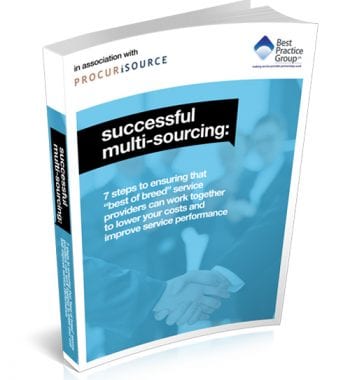This article aims to offer some useful advice on how to handle the rather delicate negotiations required to provide clarity in what can be regarded as otherwise ambiguous contract terms, unclear expectations, roles and responsibilities between you and your supplier.
We all know that ambiguity in written contract terms and schedules is something that should be avoided as much as possible. The business impact of ambiguous contract terms often leads to serious misunderstandings – and in turn, usually means conflict between you and your supplier.
However, what isn’t often realised, is that if you are the party that drafted the ambiguous contract terms, whether supplier or service user, you may well find yourself on the losing side of such a battle.
While ambiguities find their way into written contract terms, it is often (but not always) the supplier’s contract terms that seem to err on the side of ambiguity; these terms often suggesting that clarification in the contract will be addressed once the deliverables are underway.
Written contracts are often regarded as the blueprint for the entire working relationship between parties. They should encompass the rights, roles and responsibilities of all concerned, taking into account all material eventualities and the material representations made by the supplier that inform you about whether or not it will help you meet your business outcomes through the purchase of its solution.
So when you find yourself at loggerheads with your supplier because ambiguous phrasing in your written contract makes it difficult to reflect the true ‘spirit’ of that agreement, how do you go about trying to establish an evidence-based interpretation of the agreement?
How to take an evidence-based approach to interpreting ambiguity in a contract
Where ambiguity exists, there are four little known facts that can help to clarify how to take an evidence-based approach. Note that these principles are derived from recent court rulings where the vendor has represented itself as an ‘expert’ in its field.
1. Expert responsibilities
Suppliers have a duty to advise clients not only of what their advice or service covers, but also what it does not cover, and the potential impact on the project of what their advice/solution does not cover. This is called the supplier’s ‘Duty to Warn’. There is recent case law that reflects a specialist supplier’s legal responsibility (even if this responsibility is not documented within the written contract or schedules) to conduct adequate due diligence on any client project to ensure that they are aware of the impact of their involvement.
This duty begins pre-contractually and continues throughout the entire life of the contract. And, if an expert supplier is found to have not informed their clients of any material adversities their advice or solution may cause to the client’s ability to reach its business outcomes, the supplier will usually be held liable to remedy the position at its own cost.
The aim of the law here is to disincentivise suppliers from making claims and representations that influence clients into projects, the benefits of which later turn out to be untrue or exaggerated. This is further underlined by the fact that the court system considers supplier representations when looking to determine the true meaning of any ambiguous terms in a contract.
2. Behaviours rule the day over the word in the written contract
Written contractual terms are not the only way in which the English legal system determines responsibility and clarifies ambiguity. Actions really can speak louder than words, as courts usually consider the behaviour of parties to determine the true meaning of ambiguous clauses.
So, look back at your records of what was said and actions undertaken throughout your relationship with your supplier. Does their behaviour suggest a different picture to their interpretation of the vague clauses in dispute? If it does, then that will support your argument that the contract contains ambiguities. If you still meet resistance on the interpretation, there are other mechanisms to help guide interpretation, such as Senior Counsel Opinion, before heading off to the steps of the court.
3. Unfair Contract Terms Act 1977 (UTCA)
Often one party will interpret an ambiguous term to mean something fundamentally unreasonable, and in these circumstances the UTCA may be of some assistance. The act governs how courts should deal with unfair terms, which includes business-to-business contracts. This provides great assistance in areas such as the exclusion or limitation of liability for negligence, breach of contract and misinterpretation.
It can also protect the rights of clients who rely on the specialist expertise of vendors to claim ‘reasonable’ recompense from that vendor, no matter how a contract may look to restrict this, when damages are deemed applicable.
Although each situation rests on its own facts, the general principles are that it is likely a court will deem a term not to be fair, if the vendor has:
- Represented itself to the client as specialist experts in its field, say for major ICT projects or outsourcing programmes
- Known, or should have known and understood the true impact their advice or ineffective service delivery would have on their client’s ability to reach its business outcomes
- Professional indemnity insurance to cover them for such an event.
4. Contra proferentem
Often used in cases where there is a wide knowledge gap between expert and client, contra proferentum is a doctrine of contractual interpretation that looks at the ambiguous term or terms in dispute and weighs in favour of the party that did not draft the contract. This looks to redress any imbalance in the relationship where ‘expert’ status could have had undue influence over the other party agreeing to terms they did not fully understand the business impact of.
Therefore, in layman’s terms, if you are drafting a contract, be as precise and clear as possible, using language (or, ideally referring to diagrams of the operational aspects of the contract to aid interpretation) that is unlikely to be misunderstood or misinterpreted by any of the parties.
Not all contract ambiguity is a bad thing
There will be times when not all contractual factors can be clearly determined at the outset. In these situations, you may well have no alternative but to incorporate key principles instead of specifically articulated information of what you want to achieve and how.
However, where this is the case, you would expect that clarity will be offered by way of a plan of action to clarify this within an agreed time scale. For example, if service level targets can only be accurately calculated once a third party has been instructed and this is not expected to happen before contracts are signed, a clear plan of action and behavioural governance should be built into the contract. The outcome of this should be that better articulation is put into the contract on an evolving basis. It is important to diarise this constant evolution so it is not forgotten, otherwise the expectations within the contract will remain ambiguous and open to argument when disagreements arise – and they almost certainly will.
Conclusion – Ambiguous Contract Terms
Experts have a responsibility to ensure that their clients understand the full ramifications of their involvement, the good and the bad. They have a duty to inform you of the whole picture and to carry on doing so throughout their relationship with you. Your contract with them is not all that the court system will consider when you take your claim to them and, therefore, if you find yourself in a position where you are at an impasse on the interpretation of an ambiguous clause in your contract, remember all the above in your negotiations and your vendor may well consider that redrafting their contract with you to improve its clarity and help you achieve your business outcomes, is likely to be their best course of action.
Photo credit: iStock, shironosov


